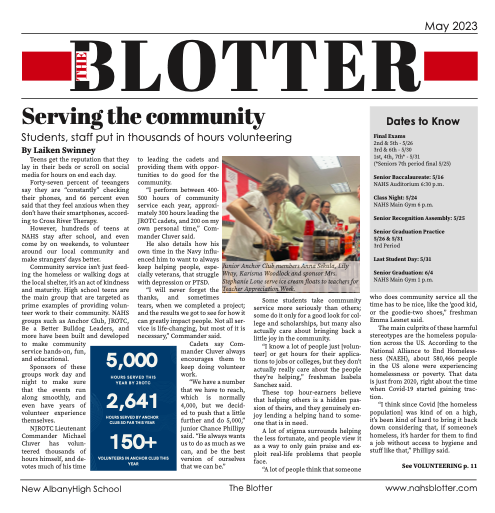By: Robbie McAnelly
AP classes are designed for students with high expectations to attend college once they graduate high school. What should be well-structured, advanced classes are becoming “transcript boosters”.
Students tend to be slightly apprehensive of taking the Advanced Placement classes, as they should be. AP classes are designed to teach a high school student enough to possibly test out of certain college courses, depending on how well they score on the AP exam at the end of the school year. What should be a beneficial learning experience to the college-bound high school student is becoming far too watered down.
Students who selected English 11 Honors or English 12 Honors for next year were recently asked to choose AP or regular English instead.
“We didn’t have as many students signing up for the classes,” English Department Chair Nathan McGarvey explained. “It was a better time to cut these classes [honors] while numbers were down. The teachers we have also made it better for more AP availability.”
Assistant Principal Bill Krammes said that English 11 Honors and English 12 Honors are being eliminated due to an unnecessary third level differentiation.
“We currently offer two levels of English in ninth and tenth grade,” Krammes said. “It was determined to continue the two level differentiation [in eleventh and twelfth grade]. It serves both the Honors and regular level students.”
Leaving AP and regular courses as the only options with no available middle ground further proves how conventional the term “advanced placement” in front of a course title is becoming. AP classes are meant for students planning on going to college once they graduate; therefore, only a select group of students should be enrolled in these classes.
While some NAHS teachers require an application-based essay or other assignment to gauge acceptance into their AP classes, many AP teachers do not require an application. Any student could, therefore, be a part of an AP class by simply signing up. Not only does this possibly place students in classes too advanced for them, but it takes away from students who truly are at AP level.
Senior Blotter staff member Katherine Kerr sees a connection between AP classes and the current attendance issues at NAHS:
“Because of how easy and watered down some of these AP classes have become, even AP students can now afford to miss classes and still stay on top of work,” Kerr said. “If these classes were more demanding, students wouldn’t be able to afford to miss class and the attendance problem would fix itself.”
While students may only be encouraged to engage in a more strenuous learning experience and a higher level of college preparedness, it is completely taking away from the true meaning of AP. With a more strenuous application process and a return to the true meaning of Advanced Placement, not only would students be able to learn much more, but attendance and school participation would likely soar as well. Leave AP to the students who truly strive to be on an advanced level.







